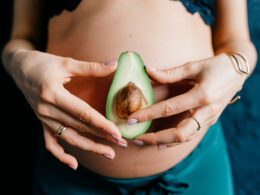If you are pregnant or want to become pregnant, you probably already know the importance of healthy nutrition and an active lifestyle to support your growing baby. But did you know it might be just as important for Dad to focus on his health too?
Research on the gut microbiome–the different types of bacteria that live in your intestinal tract–has increased in recent years. Scientists have discovered that these microbes have many interactions with their hosts (i.e., us!), both beneficial and harmful. Research suggests that a mother’s gut and vaginal microbiota impact her baby’s metabolic, immune, and brain health even outside the womb [1, 2].
A 2024 study published in the venerable British scientific journal Nature suggests that even Dad’s gut microbiome matters for Mom’s pregnancy health and for baby’s growth [3]. While the study was on mice rather than humans, the results may be generalizable to humans both because mice genomes are remarkably similar to human genomes, and also because disease patterns in mice mimic those in humans. This is an exciting new avenue of research, suggesting that Dad’s gut microbiome affects his germline tissue (the cells that form sperm), which in turn contributes to pregnancy and offspring health.
Researchers used antibiotics and laxatives to test whether male gut microbiome changes impacted offspring health
Researchers in Europe wanted to test whether changes to the male microbiome affected sperm and the health of any offspring. They used two regimens of low-dose antibiotics and one regimen of laxatives in male mice to create imbalances in the gut microbiome. The antibiotic cocktail would kill potentially-beneficial microbes in the gut, while the laxatives would increase movement of stool that could flush out certain microbe species. Researchers then bred these mice with untreated, healthy female mice.
They noticed some offspring from these mating pairs had low birth weight, smaller size, and/or a shorter lifespan when compared to control group offspring (i.e., the babies of fathers and mothers with guts unaltered by antibiotics or laxatives). The smaller baby mice, in particular, had fathers with smaller testes and lower sperm counts compared to control group fathers. Most notably, prior to treatment, all the mice had normal testicle size and sperm counts and qualities. The testicle and sperm differences were only observed after the antibiotic and laxative treatment.
How might paternal gut microbiome changes affect offspring health?
The scientists were curious about how changes to testes and sperm could influence offspring phenotype (small size and shortened lifespan) so dramatically. They tested whether there were genetic (genotype) changes in the offspring embryos, but they found no differences. However, they did find genetic changes in the cells of the mothers’ placentas.
Several genes important for placental development were expressed at lower levels when the father mice had altered gut microbiomes. The researchers concluded that changes to the gut microbiomes in male mice (due to the administration of antibiotics or laxatives) likely led to changes in both testes and sperm that ultimately led to defects in the female placenta.
The researchers concluded that changes to the gut microbiomes in male mice (due to the administration of antibiotics or laxatives) likely led to changes in both testes and sperm that ultimately led to defects in the female placenta.
This is consistent with other research suggesting that the father’s DNA creates the genetic blueprint for the placenta. Placental problems are well known to contribute to low birth weight, intrauterine growth restriction (IUGR, poor growth), preeclampsia (more on the connection between semen and preeclampsia here!), and other fetal and maternal problems.
It’s fascinating to consider that the male mice’s sperm didn’t cause genetic changes in their offspring, but they still affected their offspring’s health via the health of the placenta. This is especially striking given that the mother mice’s own gut microbiomes were not affected by mating with the treated male mice. Only their babies were affected.
Were gut microbiome changes in treated mice permanent or temporary?
Once they identified changes in offspring, the next question the researchers had was whether the changes to the microbiome were permanent. To test this, they stopped antibiotic or laxative treatment for a recovery period of up to 8 weeks. They allowed the mice to continue mating with healthy females after 4 and 8 weeks during the recovery.
After 8 weeks of recovery, the differences in offspring size and survival were gone, and the offspring of the altered (and now recovered) mice resembled the healthy control offspring. This makes sense given that sperm’s life cycle is about 70 days long: after roughly two months of recovery, all the sperm created during the treatment period would be gone. This experiment therefore suggests that changes to the male microbiome from antibiotics and laxatives are not permanent, and stopping antibiotic or laxative use may allow the microbiome (and therefore, by extension, sperm health) to return to a normal state.
The investigators learned several important things from their experiments
To sum, here’s what the researchers learned from observing the differences in offspring between male mice with altered gut microbiomes, and those with normal gut microbiomes:
- Low-dose antibiotics and laxatives were sufficient to change the male gut microbiome composition.
- When male mice with changes to their microbiome mated with healthy female mice, some of the offspring had lower birth weight and worse survival outcomes compared to offspring from healthy mice.
- The researchers suggest male microbiome changes affect male sperm, which in turn impacts placenta development, and therefore the health of offspring before and after birth.
- The effects of the male microbiome on offspring were reversible after 8 weeks off antibiotics and laxatives.
Research into the effect of a dad’s gut microbiome on his child’s health is in its infancy stages (pun intended!). It isn’t clear whether these animal study results are comparable to what would happen in people, and it would require observational–not experimental–studies in humans, as it would be unethical to do an experiment on people that has the expectation of poor outcomes for human babies. Furthermore, the researchers only found effects that were associated with changes to the male gut microbiota. They weren’t able to find a direct mechanism of why or how specific microbe changes in the fathers caused low birth weights or shorter lifespans among their offspring.
What does this information mean for you?
We know nutrition greatly affects our gut microbiomes. How does this new research into the connection between a dad’s gut microbiome and his child’s health affect you if you’re pregnant or trying to conceive? First, you should know there is a growing body of research suggesting Dad’s nutrition (particularly folate intake) prior to conception could impact his sperm, and thus his baby’s health and future development [4]. The focus isn’t just on Mom anymore!
There is a growing body of research suggesting Dad’s nutrition (particularly folate intake) prior to conception could impact his sperm, and thus his baby’s health and future development [4]. The focus isn’t just on Mom anymore!
While many people are familiar with the importance of nutrients such as folic acid, vitamin B12, and healthy fats for moms during pregnancy, it’s important to realize that even dads may benefit their babies by beefing up their nutrition before trying to conceive.
What if your partner didn’t follow any of this advice?
Now that the scientific community is recognizing the importance of both Mom’s and Dad’s nutrition on their baby’s health and development, more research should be done to pinpoint health factors influenced by either or both parents. If you are currently pregnant, you needn’t worry that your partner ruined your baby’s health. Instead, focus on factors you can control like a healthy diet, plenty of nutrients (for example, taking a quality prenatal vitamin and eating a varied whole foods-based diet), and regular exercise.
For now, one of the best ways you can improve your own gut microbiome (man or woman!) is to eat a variety of nutrient-dense foods, particularly foods high in fiber. Fiber feeds the bacteria in your gut and can contribute to a healthy microbiome balance, and it can also decrease your risk of issues like constipation, hemorrhoids, and even some cancers. Probiotic-rich foods like yogurt and other fermented foods like sauerkraut can also improve your overall microbiome (but note that pasteurization kills the probiotics in sauerkraut and other fermented foods!).
Certainly, this research suggests a new meaning for the phrase ‘Eating for two.’ Perhaps Dad’s nutrition is important for Mom and baby’s health!
Additional Reading:
Can semen prevent preeclampsia?
Natural Womanhood Book Review: Real Food for Fertility
Is your pregnancy diet up to date with science?
A guide to trace minerals for preconception, pregnancy, and postpartum health











